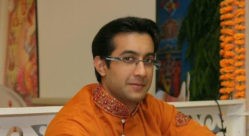Pt. Varistha Persad, Pundit, SWAHA International
BA, MA, PG Dip. Ed. (UWI), OCT (Intermediate, Senior), DDSB, Durham District School Board, ON (res.), OVS, Ontario Virtual School, ON, TIII (English), Ministry of Education, TT (res.)
Meditation, yoga, mantra jaap, puja, havan and other spiritual practices in Hinduism allow us to ‘turn inwards’ so that we can understand ourselves as divine beings existing in this world temporarily. Many, unfortunately, interpret this inward journey to be one of self-importance and label it as a rejectionist attitude towards the world. This convenient outlook perpetuated by members of western traditions corrupt the minds of young Hindus, causing the instability that we constantly deal with as spiritual advisors and leaders. The peace of mind, control, resilience and positive attitude that once defined a Hindu have now been inverted, particularly through social media, so as to weaken our resolve and purpose. It is no longer safe, popular, fashionable or even respectful for members of other religious persuasions to enjoy ‘Hindutva’.
Even as Hinduism is recognized as dynamic, and the ability of Hindus to adjust to changing circumstances is admired, there are many mistakes being made and perpetuated by uninformed spiritual leaders and organizations; these then become a primary source of information, which cause major confusion amongst followers. Many sects and factions are rejecting essential practices that are fundamental to one’s spiritual growth and development and it is causing turbulence in Hindu communities. In this case, the advice is to stick to who you know and those that know, especially with the advent of ‘iPad pundits’ and kathas that are sourced from websites. The compromises that many Hindus are making when choosing their spiritual guides are shocking, even in this time of dubious standards, ethics and morality. Just as we are picky about every other choice that affects our normal day-to-day life, so too should we consider carefully the ones that are supposed to help us on our spiritual journey.
Even as we celebrate our ‘Hinduness’, we are bogged down by a highly sensitive society that rides the waves of identity, in terms of what should be celebrated or negated. Anyone who deviates from the norm or goes against the current of identity politics, creates a tsunami of opposition and becomes the poster child for everything deviant. We must become more aware of the shifting sentiments around the ability to express one’s identity; we must not follow like sheep but we should be aware that our society could be negative to those who knowingly or unknowingly choose to operate on their own ideals.
Hinduism is currently being featured specifically on the news and on the tongues of many, for its teachings, inclusive philosophies, practices and general outlook. The world is incorporating the peaceful movements of yoga, meditation, mantra jaap and positive, interactive festivals such as Phagwa or Holi, which are celebrated in large numbers by many cultures throughout the world. Today, yoga is being performed in Times Square, New York, while karma, reincarnation and Hindu philosophies are being adopted by people of the West.
The global flow of Hinduism is inciting leaders of other faiths to incorporate into their sermons, Hindu teachings and practices so as to keep their following. The message of Hinduism is being carried around the globe and into the future as the truth. Just as there are both Hindus and professionals, the cry goes out that we must become professional Hindus and ascribe to our teachings and traditions. It is not necessary to validate Hinduism based on western assimilation; however, it is important to accept that only the truth can dissolve the lies; only light can illuminate darkness; and in this way, Sanaatan Dharma can survive the challenges of the modern world.
We must incorporate the sensitivity of a poet in our dealings and relationships with other human beings and the natural world; the intellect of a scientist when reading and understanding our highly symbolic and philosophical scriptures; and lastly, the love of a devotee when thinking of the Almighty. Only then can we claim to be ‘living’ Hinduism.



